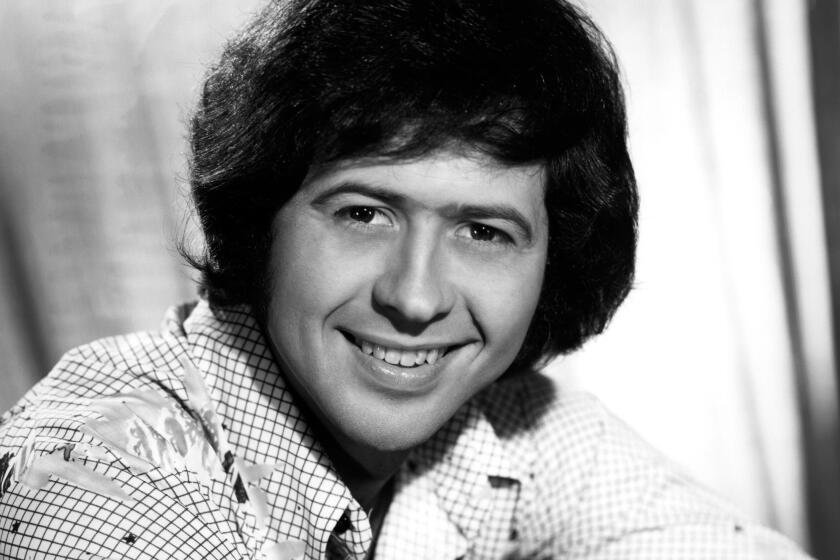Chicago Six Transformation Highlights Duke Ellington
- Share via
Until a fan interceded, the Chicago Six had subsisted on a steady diet of early jazz, primarily the New Orleans music of the teens and 1920s and the Swing Era stuff of the 1920s and 1930s.
The work of Edward Kennedy (Duke) Ellington, who wrote thousands of pieces during more than 50 years in jazz, was modern by comparison. The Six hadn’t even considered playing it at the many traditional jazz festivals it works, where earlier jazz is the nostalgic norm.
Then came the fluke encounter.
“What happened was, I got a call and this woman asked if I wanted to buy some records,” said bassist and group leader Bob Finch. “She knew the group, and she left a message for us at the Belly Up Tavern. About two weeks later I went over, and it was a box of 54 pristine Ellington albums.”
Finch took them home and gave them a spin.
“I listened a lot to the smaller groups, especially the ones with Johnny Hodges. I prefer the 1940s and early ‘50s bands,” he said.
The music began to get under his skin, and at a jazz festival at Lake Havasu last year, he could no longer restrain the itch.
“I just said, ‘The hell with it. We’re going to do an all Ellington set.’ After three solid days of Dixieland music, everyone agreed.” To Finch’s surprise, the audience wasn’t disappointed or thrown for a loop by the sudden switch in direction. They loved the music as much as the group did.
Hooked on the Duke, Finch selected 16 of his favorite Ellington tunes for inclusion on the band’s new cassette, “The Chicago Six Plays Duke Ellington.” The result is a polished piece of work including fresh readings of such finely crafted, subtle swingers as “Things Ain’t What They Used to Be,” “Solitude,” “In a Mellow Tone,” “Caravan,” “Black Butterfly,” “Sophisticated Lady” and “Don’t Get Around Much Anymore.”
Recorded at Studio West in San Diego in December and January, the album has glossy, smooth production values well suited to Ellington’s subtle melodies and ensemble voicings.
And the Chicago Six more than does the music justice. With Finch and drummer John Hall (the only two founding members left in the group) pushing the beat, the four other members prove themselves equally adept at tight, Ellingtonian counterpoint and improvisation.
Clarinetist Bobby Gordon’s work is especially strong throughout the album, whether he’s providing sinewy support lines that twist and turn beneath the brass section’s leads, or improvisations with all the style and finesse of the Duke himself.
On “Satin Doll,” the horns state the buoyant theme together before Gordon takes the second section of melody alone. His understated, incisive reading gives the tune a satin sheen.
When he takes the first solo on “It Don’t Mean a Thing,” Gordon turns in an energized performance that calls to mind zoot suits and Harlem ballrooms filled to the brim with a sweaty, salty stew of dancers.
“The Chicago Six Plays Duke Ellington” is the fifth self-produced cassette from the band, formed 10 years ago when Dave Hodges, owner of the Belly Up Tavern in Solana Beach, asked Finch to bring in a jazz band. Finch assembled the Chicago Six, originally fronted by clarinetist Bill Reinhardt, and the group has been doing Fridays at the club ever since.
You can buy a copy of the new cassette from the group at the Belly Up, or order one by mail (send a check for $10 to Bob Finch, Box 173, Cardiff 92007). Or you can get a taste of the band’s new, Duke-ish direction, along with older material, during the Friday evening Belly Up gigs from 5:30 to 8.
In frustration, guitarist Jim Storey has dissolved his fusion band Open Channel in favor of a straight-ahead jazz unit called the Jim Storey Quintet. The group debuts tonight at 8 at the Marquis Public Theater.
“We were not getting a lot of response to our original fusion jazz,” Storey said. “The clubs we were trying to get into wanted to hear more of a copy of Lites Out fusion, David Sanborn, the kind of fad that seems to be tapering off. I like to keep the improvisational part of jazz no matter what style I play. I don’t like to have a locked-in format. A lot of the Lites Out stuff is real predictable.”
The lineup of Storey’s “new” group is actually much the same as Open Channel’s: Steve Feierabend on sax, Chris Conner on bass, Ken Kimmery on drums, plus new addition Will Martin on trombone. It’s just the music that has changed, heading away from tightly scripted fusion toward looser, straight-ahead jazz.
Straight-ahead jazz has a tough time finding audiences in San Diego, and Storey has made his task even tougher by concentrating on all-original music. The group has 30 to 40 originals in its bag and will deliver two sets of six each tonight, stretching the songs with extended improvisations.
Storey is a San Diego native, a product of student bands at La Jolla High School and Mesa College. Like other musicians in his age bracket, Storey, 37, cites an eclectic mix of influences.
“Wes Montgomery was my favorite guitar player, Jimi Hendrix was my second favorite. They’re about as opposite as you can get, but they have some things in common, especially an intuitive music sense, the way they played by ear.
“Coming up through rock, I checked out all the regular guitar players, then I started listening to jazz: Kenny Burrell, Joe Pass and the horns--Charlie Parker, John Coltrane, Monk, Miles.”
Following the Marquis performance, Storey hopes to to be playing local clubs with the band soon.
RIFFS: Organist Joey DeFrancesco, 19, proved that his youthful virtuosity goes beyond music. Not quite happy with the performance of his rented Hammond B-3 organ last week at Elario’s, he whipped out his soldering gun and made a quick alteration. . . .
Flutist-saxophonist Lou Tabackin, best known in recent years for his work with the Akiyoshi-Tabackin Big Band he leads with wife Toshiko Akiyoshi, opened three nights at Elario’s Monday in a more intimate setting. Backed by Jim Plank on drums and Marshall Hawkins on bass, Tabackin will have room for expansive improvisation. . . .
Poet-singer-social reformer Gil Scott-Heron is expected to inject some commentary on the Persian Gulf War into his -shows Thursday through Sunday at Elario’s. . . . Jazz guitarist Tal Farlow will be one of a half-dozen six-string men featured in the “Masters of Steel String Guitar” program this Friday (Feb. 22) at 8 p.m. in the Mandeville Auditorium at UC San Diego. . . .
Flutist Holly Hofmann will be joined by bassist Bob Magnusson, drummer Tim McMahon and pianist Mike Wofford Friday night at 8:30 at the Horton Grand Hotel downtown.
More to Read
The biggest entertainment stories
Get our big stories about Hollywood, film, television, music, arts, culture and more right in your inbox as soon as they publish.
You may occasionally receive promotional content from the Los Angeles Times.










